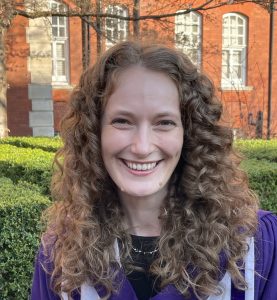
This week we spoke to Dr. Sarah Thomas, a Research Fellow in quantum optics and an alumni of the CDT in Controlled Quantum Dynamics.
What was your path into Physics like?
As a child I was always very curious and inquisitive, and was always trying to work out how things worked. My family is also very science-y, my grandad was a physicist, so I was always encouraged to figure out how things worked and solve puzzles. I really enjoyed Maths and Physics at school, and I couldn’t decide which one I wanted to do, so for my undergrad I did Maths and Physics for my first year. From the second year on, I decided to focus on Physics. I think for me, it was because I enjoyed that it was more practical, more related to the real world, and I enjoyed that aspect more than the more abstract side of Maths.
What was your PhD thesis on? What is the topic of your current research?
I work in the field of Quantum Photonics – developing quantum technologies using light. There are two main resources that are really important for optical quantum technologies: one is a single-photon source, to generate the quantum states of light that we use to encode quantum information, and the other is a quantum memory which is a device that allows you to store quantum states of light and then retrieve them at a later time. Quantum memories are really important to enable synchronization of different operations in quantum computing, and to allow you to send information over long distances, to be able to scale up optical quantum technologies.
For my PhD, I worked on quantum memories at the University of Oxford. The type of quantum memories that I worked on are based on an ensemble of warm atoms. We store single photons in the atomic ensemble by a controlled two-photon absorption process that is driven by a strong laser pulse. This maps the single photons onto an atomic coherence, and then at a later time we can retrieve the photons again by reversing the process.
After my PhD I worked as a postdoc in the Centre for Nanoscience and Nanotechnology in Paris, where I was working on developing single-photon sources. The technology that we used there is based on semiconductor quantum dots inside a cavity, and these have recently emerged as really promising sources of single photons.
Now I am a Research Fellow at Imperial and working again on quantum memories. The eventual goal is to bring these two technologies together, to be able to interface good sources of single photons based on semiconductor quantum dots, and atomic quantum memories. The interface of these two devices is the building block that you would need to work towards scalable quantum technologies.
What has your experience been like as a woman in Physics?
I remember really clearly that on the very first day of my undergrad degree one of my fellow students said to me: “it must have been much easier for you to get in, because they always have to let a few women in”. I took it to heart and for a long time I constantly felt like I didn’t deserve to be there or like I wasn’t as good as everyone else. In particular during my PhD I really struggled with impostor syndrome, and felt like I was always waiting for everyone to realize that I didn’t really belong there. It’s something that has taken quite a long time to work through, to finally feel like “Actually, I do know what I’m doing and I do deserve to be here.”
Other than that, I’ve not really had any negative experiences as a woman in physics. I’ve been really lucky, and have been surrounded by really supportive, wonderful people and have had some really great mentors. I think that’s something that’s really important: to have mentors and role models, and people you can turn to for advice. Not necessarily just women role models, but also men as mentors who are supportive and encouraging as well. When I was in Oxford, the Women in Physics society had a mentoring program where you could both be a mentor and a mentee. I got involved in that and it was great, since you could offer advice to undergrads but also be advised by staff, which was really encouraging. That’s something that is great about the Women in Physics society, that it brings people together from all across the university, from students to professors.
What advice would you have for yourself earlier in your career?
Have confidence in yourself that you do deserve to be there. And celebrate small wins. As a student or researcher you’re often striving for the next thing, and you just need to stop and say “oh, that’s really cool! I did that thing, let’s stop and celebrate that”.